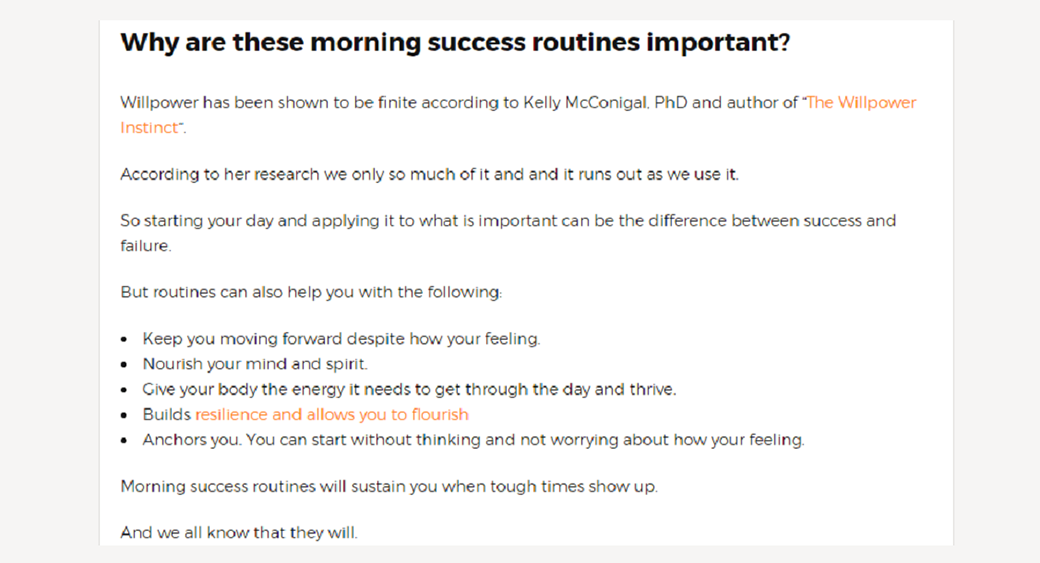Content Marketing Secrets Borrowed from Fiction Writers
The inclination to listening stories is encoded in our genes. In the book The Storytelling Animal, Jonathan Gottschall (a scholar specializing in literature and evolution), supports the notion that human beings are natural storytellers. One of the core content marketing secrets is that good stories make us expect something exciting, and that’s exactly what makes us listen.

Content marketers understand the power of storytelling. It’s no wonder why we see a story for the weekend spent with family before we get to the recipe on food blogs. When you want to engage your audience, you need to tell a story. That’s a trick we learned from fiction writers. You know what? It’s not the only method we can borrow.
Content marketers have a lot of content marketing secrets to learn from fiction writers! Shall we start the countdown?
9 Content Marketing Secrets to Learn from Novelists
Your Message Is More Effective When You Use Action Words
“I can remember the tail slapping and banging and the thwart breaking and the noise of the clubbing. I can remember you throwing me into the bow where the wet coiled lines were and feeling the whole boat shiver and the noise of you clubbing him like chopping a tree down and the sweet blood smell all over me.”
That quote comes from Hemingway’s The Old Man and the Sea. Hemingway did not become famous because of some “relaxing” or “pretty” literature. Oh, no! He is still one of the most beloved writers because his work is powerful. The books are full of action, and you’ll notice the same thing if you just read the quote above once again.
Slapping, banging, breaking, clubbing, throwing, shiver, chopping… all these words are action verbs. There’s no complex definition for them: action words are words that describe actions. Non-action verbs, on the other hand, stand for a sense, opinion, or need. Remember, for example, is a non-action verb.
Now you’ll think: well Hemingway used to remember, too. Of course, he also used non-action verbs. The sentence above, however, is based on action and that’s exactly what makes it so powerful. You can practically visualize the scene that the author describes.
Use your action verbs! Instead of writing “How do you get through a bad day?” you can write a much more powerful sentence, such as “How do you get through a day when your boss got a flat tire and is now yelling at everyone in the office? How do you get through a day that started with spilling coffee, eating a bad breakfast and being splashed with mud by a passing car?”
You see? When you involve more action in your writing, it immediately makes your content more interesting to read. Thanks Hemingway!
Add More Detail
“Above the Kolocha, in Borodino and on both sides of it, especially to the left where the Voyna flowing between its marshy banks falls into the Kolocha, a mist had spread which seemed to melt, to dissolve, and to become translucent when the brilliant sun appeared and magically colored and outlined everything.”
That’s a sentence from Tolstoy’s War and Peace. It’s a book of almost 3K pages. It’s full of descriptions. But you know what? It works! Tolstoy captures the attention of the reader and paints a picture. Those details are exactly what makes this book so impressionable. You can practically see the battlefield in front of your eyes.
This approach works in content marketing, too. No; it doesn’t mean you should write a blog post of 3K pages. No one would read that. You must still keep your content straight to the point, but you should give the readers all the details they need, so they can fully get your message. And that is one of the coolest content marketing secrets.
Let’s check out a good blog post that proves how effective details are. Can you think of a better representative of the “school of details” than Neil Patel? His blog posts give you all the background you need before they start informing you about the particular topic in detail. As a particular example, let’s take a look at this post: Everything I Taught You about SEO Was Wrong.
That’s pretty long form for a blog post. But Patel grabs and holds the reader’s attention by presenting relevant details that prove his point.

The lesson to learn? Just give the details! Instead of saying “this is a very good product,” explain how great it actually is. Use content marketing secrets, add practical experiences and give details on all aspects of the product, so the audience can compare it with competitive offers before they make a decision.
The details spare you from having to state the obvious. With this approach, you’ll show instead of telling.
Use Your Numbers
Let’s take Tolstoy and his War and Peace as an example again. He’ll tell you the numbers of people who died in each battle. When you read about wars, you’re merely aware of the harsh reality that hit those people. Tolstoy makes you understand that these were just ordinary people, like you and I. And when he tells you how many of them lost their lives in the war, the reality hits you hard.
When great writers write their fiction, they know they can’t convince the reader to believe something unless they make that idea as believable as possible.
Great content marketers know that, too. Just look at Neil Patel’s content. You’ll find numerous examples, percentages, and numbers that prove each point he makes. If he cannot find a relevant case study, he’ll just conduct a survey to get his numbers.
That content marketing secrets approach works!
Don’t Use Fillers
“Shadow had done three years in prison. He was big enough, and he looked don’t-fuck-with-me enough that his biggest problem was killing time. So he kept himself in shape, and taught himself coin tricks, and thought a lot about how much he loved his wife.”
That’s how Neil Gaiman’s American Gods starts. It’s one of the most effective introductions in modern literature. It’s great because we learn a lot from this character in just three sentences. Gaiman did not waste time to describe an opening scene and give us the background. He gets straight to the point and we immediately meet one of the main characters of the story.
Empty words spoil fiction. The time of excessive use of adjectives is long gone, and we couldn’t be happier about it.
It’s time for content marketers to learn the same lesson. Follow content marketing secrets and don’t try to hit the 1000-word limit by any circumstances. Long-form content is great only when it’s relevant and engaging from the first to the very last sentence.
Rely on the Work of Other Writers
As long as you’re not plagiarizing, there’s nothing wrong in borrowing other people’s work to make an impression. Woody Allen’s comic film Zelig is based on Kafka’s The Metamorphosis, which serves as an intertext. Franz Kafka was impressed by Dostoevsky’s The Brothers Karamazov, and you can easily sense the subtle references in his books. Albert Camus wrote an entire book (Rebel) based on The Brothers Karamazov.
Great writers inspire each other. No one became great out of the blue. These writers did a lot of reading and analysis before coming up with their own masterpieces.
The same thing can be said about content marketing secrets and content creation strategies, too.
You have to do tons of reading and research before you can compose a brilliant article or blog post. People don’t want to read your opinions. You’ll convince them that your point makes sense solely if you support it by facts.
So do your reading. Do your research. But don’t forget: when you rely on the work of others, you have to tell your readers where the references come from. Be very clear; otherwise, you risk being labeled as a plagiator.
Do you want proof that this works? Just check Jeff Bullass’s blog. Bullass is one of the most brilliant content marketers at this point, so he’s definitely worthy of your time. I’ll just pick a random post: Morning Success Routines That Will Transform Your Life.

You see? His opinion is not enough, so he uses content marketing secrets and supports it with facts and references.
Write about Something You Know
Hesse is another masterful writer we can learn from. Most of his work is based on the religious philosophy of the Far East. When people read Siddhartha, they don’t take the book as a relaxation read. They learn from it.
Hesse invested many years of his life to get to know this philosophy. There are plenty of modern writers inspired by the same concepts (Coelho and Sharma, I’m looking at you), but they don’t even come near to Hesse’s level of excellence. That’s because they don’t know enough, so their work looks superficial to a true connoisseur.
Here’s what Hesse said about his trip to India: “I have admired Buddha for many years, and have been reading Indian literature since my earliest youth. Later, I became more familiar with Lao Tsu and the other Chinese philosopher. My journey to India was but a small addition to, and illustration of, these thoughts and studies.”
Studies. That sounds serious, doesn’t it? Well, if you want to be the best writer, you have to be serious about it. It doesn’t matter whether you’re focused on fiction or content marketing; the need for learning remains relevant. And this feature belongs to the content marketing secrets.
As a content marketer, you cannot specialize in everything. You have to pick a niche. If you already have your own blog or business, you know what you have to keep learning about. If you’re a freelance writer, you might think there’s tons of space to be flexible, but let’s face it: you’ll write your best content when you tackle topics you know.
Pick your niche. Work on that knowledge. The more you know, the greater value you’ll deliver to your readers.
Conflict Is Good
Can you think of a single masterpiece in the literature that doesn’t involve conflict? This is an integral aspect of the plot.
Do you want an example? Sure!
The Great Gatsby would be good! We see Gatsby spending his life trying to show how rich and successful he is. Everyone wants to attend his elaborate parties. But the one woman he wants to see there doesn’t show up. When she does show up, we have a major conflict: Gatsby vs. Tom Buchanan.
Would this book be so great if Gatsby simply attracted Daisy at a party and things ended there? Remember: the story ends when the conflict ends. So we would be looking at a pretty short and unimpressive book there.
When the reader faces conflict, the content is more engaging. That’s a standard rule in content marketing, too.
Let’s say the marketing team of a writing service wants to attract more students to buy papers online. What will they talk about? Conflict; of course! They will mention the fact that modern education is too demanding. They will say that the professors don’t guide the students through the writing process. With lack of instructions and too much work to handle over a short period of time, the students are clearly facing a conflict situation. They want to live their lives like any young person should, but they are stuck with projects.
A great content marketer will use that conflict to show how important the service is and how much the student needs it.
You get the picture, right? Intrigue the reader with a real problem that they face. Then, give them solutions.
Make It Effortless
“My grandfather’s cousin – by courtesy my great-aunt – with whom we used to stay, was the mother of that aunt Leonie who, since her husband’s (my uncle Octave’s) death, had gradually declined to leave, first Combray, then her house in Combray, then her bedroom, and finally her bed; and who now never ‘came down,’ but lay perpetually in an indefinite condition of grief, physical exhaustion, illness, obsessions, and religious observances.”
Be honest: reading and understanding that sentence demanded a great deal of effort on your side, didn’t it? Actually, that sentence comes from a brilliant writer – Marcel Proust. But if we’re completely honest, we’ll have to say that not many people appreciate his work nowadays. Do you know why? It’s just too much.
You can tell he invested a lot of effort in every single sentence. You imagine him struggling, trying to perfect the form and editing to perfection.
Hemingway’s work, on the other hand, seemed much more effortless. That’s exactly why he still is popular among today’s readers.
Make your content easy for the readers to understand. You don’t want them to go back to a sentence because they lost you somewhere in the middle. No one will bother doing that. How do you simplify your content? The most important thing you need to do is avoid adverbs and passive language. Those are the culprits of clutter in your sentences.
When you’re done writing, follow the content marketing secrets and edit! Aim towards a lower word count. If, for example, you just wrote a text of 1000 words, aim to cut at least 10% of it (that would be 100%). Of course, you think everything is important, but you’re wrong. The first draft always gets better when you edit some things out.
Introduce Suspense in Your Writing
Suspense is the feeling of anticipation and anxiety that the writer makes you feel. The author gives you hints and you know that something huge is going to happen, but you don’t know exactly what to expect.
This is an incredibly important element in crime and action fiction. When it comes to The Brothers Karamazov, for example, the suspense is what keeps you turning those pages no matter how long the book seems. The author draws you into the story and you bite your nails, waiting to see what happens.
Suspense works in content creation, too and is one of the core content marketing secrets.
To achieve such a sense of anticipation, you need to tell your readers that you’re going to share a very important message. You can do that in the headline itself, but you mustn’t turn it into a click bait. When you promise something, you have to deliver!
Take this article as an example: How Warren Buffett and Steven Spielberg Used Strategic Relationships to Launch Their Careers.
The article immediately makes us expect some kind of solution to a conflict we have: we want to launch a career but we don’t have a starting point. So we see these insanely successful people being mentioned, and we clearly want to know what happens next. That’s suspension. Your articles could really use it!
It All Comes Down to One Thing – Show; Don’t Tell
To sum the content marketing secrets up, these are the most important things that content marketers can learn from fiction writers:
- Use action words;
- Add more detail;
- Include numbers;
- Don’t use fillers;
- Quote other writers;
- Write about something you know;
- Introduce a conflict;
- Make it effortless;
- Add suspense.
It is not enough to just use the content creation tools and practices. If we could extract a single thing that all these tips have in common, this is the one: show; don’t tell! We didn’t need Dostoevsky to tell us that the father Karamazov is kind of a jerk. The writer showed that through the character’s action.
We don’t need Neil Patel to specifically say that something works. He shows that through the statistics and examples he presents.
That’s what successful writing is all about, and it doesn’t matter whether we’re talking about fiction or content marketing.




Leave a Reply